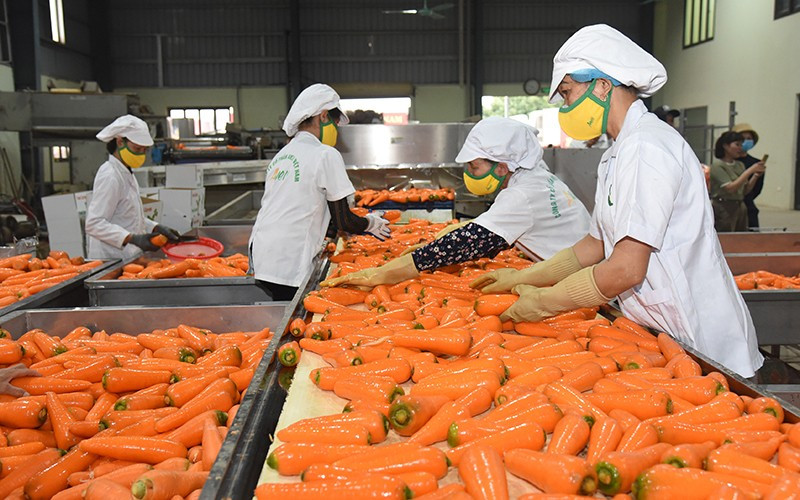Vietnam’s largest export markets for agricultural, forestry, and fishery products include the US, China, and Japan. Markets with untapped potential include the European Union (EU), the RCEP region, ASEAN, and the Middle East. These markets also issue numerous notifications annually regarding SPS (sanitary and phytosanitary) measures, requiring strict compliance from exporting countries.
Increasing pressure on agricultural products
Deputy Director of Vietnam SPS Notification Authority and Enquiry Point Ngo Xuan Nam said that in the first half of 2024, notifications of changes and draft SPS measures from the EU increased by nearly 20% compared to the same period in 2023, making it the top notifier among Vietnam’s agricultural trade partners. From 2000 to date, countries in the Asia-Pacific region have shown a rising trend in notifications, climbing from nearly 250 in 2000 to over 1,100 in 2022.
Moreover, Vietnam's key trading partners for agricultural, forestry, fishery, and food exports, such as the US, Japan, the Republic of Korea, and China, account for over 60% of all notifications.
Currently, four Vietnamese products are subject to border inspections, including dragon fruit at a 30% frequency, chilli peppers at 50%, okra at 50%, and durian at 10%. The EU reviews its enforcement of enhanced measures, additional inspections, and import management every six months. Based on these reviews, inspection frequencies may increase or decrease, or requirements for supplementary food safety certificates and testing results may be imposed. "If timely solutions are not implemented, the frequency of inspections could rise", noted Nam.
According to Vietnam SPS Notification Authority and Enquiry Point, the rise in warnings stems from exporters not fully adhering to importers' regulations on Maximum Residue Levels (MRLs) of pesticides, as each active ingredient may have varying requirements in different countries. Addressing these challenges requires in-depth research and a thorough understanding of science and technology to meet specific standards. Additionally, traditional production practices in some areas lack proper planning and guidance on using pesticides, antibiotics, and fertilisers.
Meanwhile, monitoring rates for planting area codes and packaging facility codes remain low, particularly for key export fruits such as durian and dragon fruit. Furthermore, feedback on Vietnam’s draft SPS measures is limited, with only a few localities actively participating and providing timely and comprehensive input. This lack of engagement misses an opportunity to influence policies that facilitate agricultural exports.
Luong Ngoc Quang from the International Cooperation and Communications Department (under the Plant Protection Department) noted that China is Vietnam's largest export market for fruits and vegetables. However, specific market access negotiations and protocol agreements are required for each product to be officially exported to China. Exporters must register under Orders 248 and 249 and declare planting area and packaging facility codes.
For the EU market, while Vietnamese fruits and vegetables benefit from tariff preferences under the EU-Vietnam Free Trade Agreement (EVFTA), the EU emphasises SPS measures, especially MRLs. If an MRL for a pesticide has not been established by the EU and is absent from its database, the default limit applied is 0.01 mg/kg.
Accurate and prompt compliance with quality regulations
According to the Vietnam Trade Office in Belgium and the EU, as of early June 2024, Vietnamese instant noodles were removed from the EU’s food safety control list after meeting the EU’s requirements. This success highlights the effective and coordinated efforts between state management agencies and businesses, swiftly and accurately updating and complying with EU regulations and standards.
Vo Van Hoai, an Acecook Vietnam Joint Stock Company representative, emphasised that the Vietnam SPS has become a key hub supporting Acecook and other companies in the instant food sector to understand market standards. This support has helped resolve challenges for businesses entering international markets. Such assistance is especially crucial in the EU market, where tariff preferences under the EVFTA offer competitive advantages, but technical measures are more stringent, requiring strict compliance.
In addition to timely and accurate updates on market-specific requirements, businesses must enhance their capacity to comply by partnering with competent inspection agencies to ensure successful international exports. According to Henry Bui, Director of Hoan Vu Science and Technology Co., Ltd., his company has successfully implemented traceability and tracking systems for honey products exported to the US and Europe using cutting-edge equipment and technologies.
When entering high-quality markets, precise quality inspections are essential to avoid warnings that could harm the reputation of Vietnamese businesses and agricultural products. Hoan Vu Company is also prepared to provide inspection services to Vietnamese industries, facilitating smoother export pathways for agricultural goods.
Highlighting the importance of compliance with sanitary and phytosanitary (SPS) measures, Le Thanh Hoa, Director of the Vietnam SPS, stated: “One of the most pressing issues in Vietnam’s agricultural exports today is food safety and plant and animal quarantine. Many producers and exporters lack full awareness, leading to non-compliance with export standards”.
On the other hand, production and processing technologies used by some enterprises still have uncontrolled stages, increasing risks of contamination or pesticide residue. During efforts to assist businesses in meeting import regulations, it was observed that numerous facilities seeking certifications such as HACCP or Halal often lack detailed information about the requirements. In response, the Vietnam SPS is committed to providing information on quarantine and phytosanitary standards, helping businesses achieve full compliance with the regulations of importing countries.
















